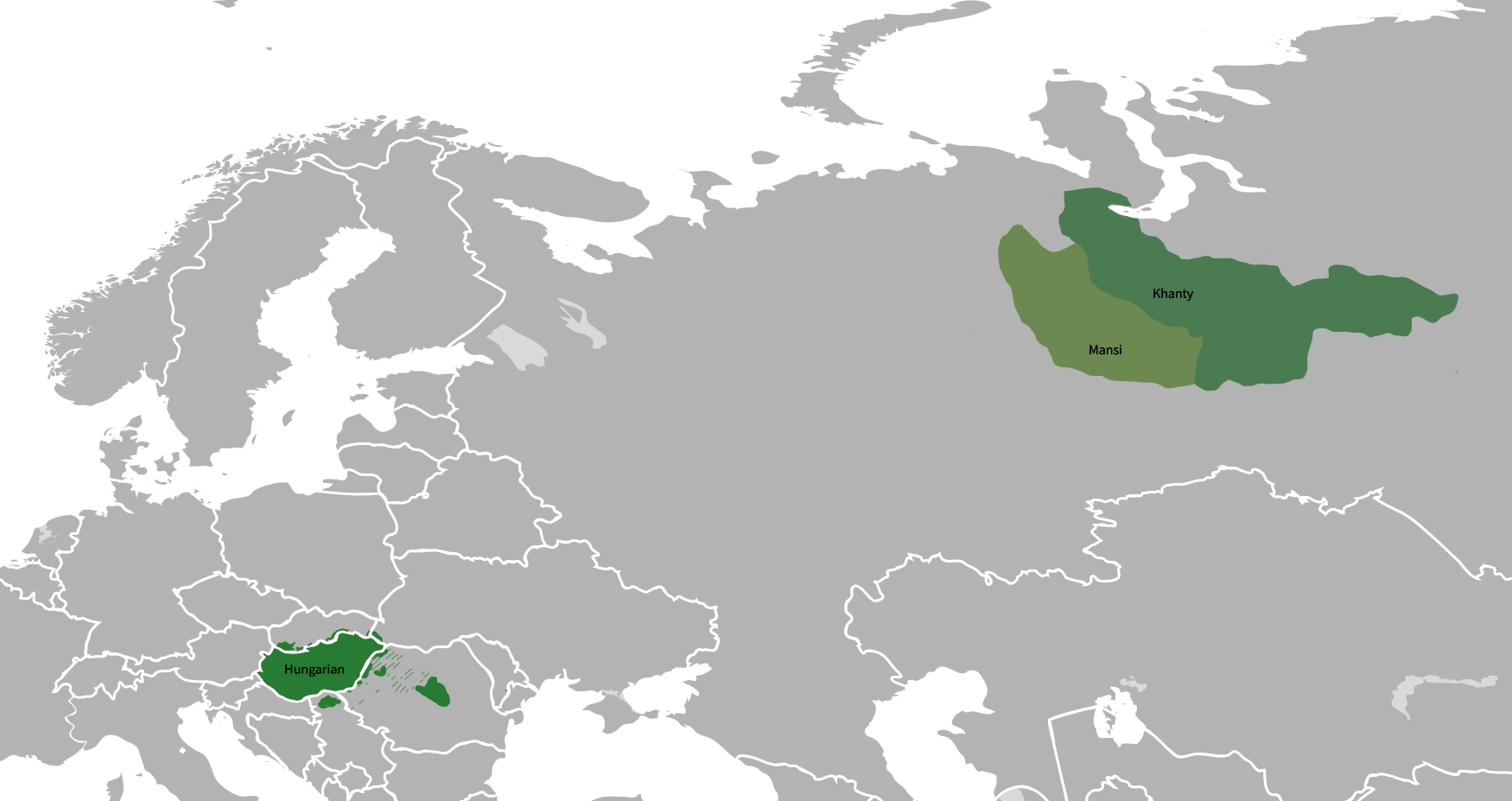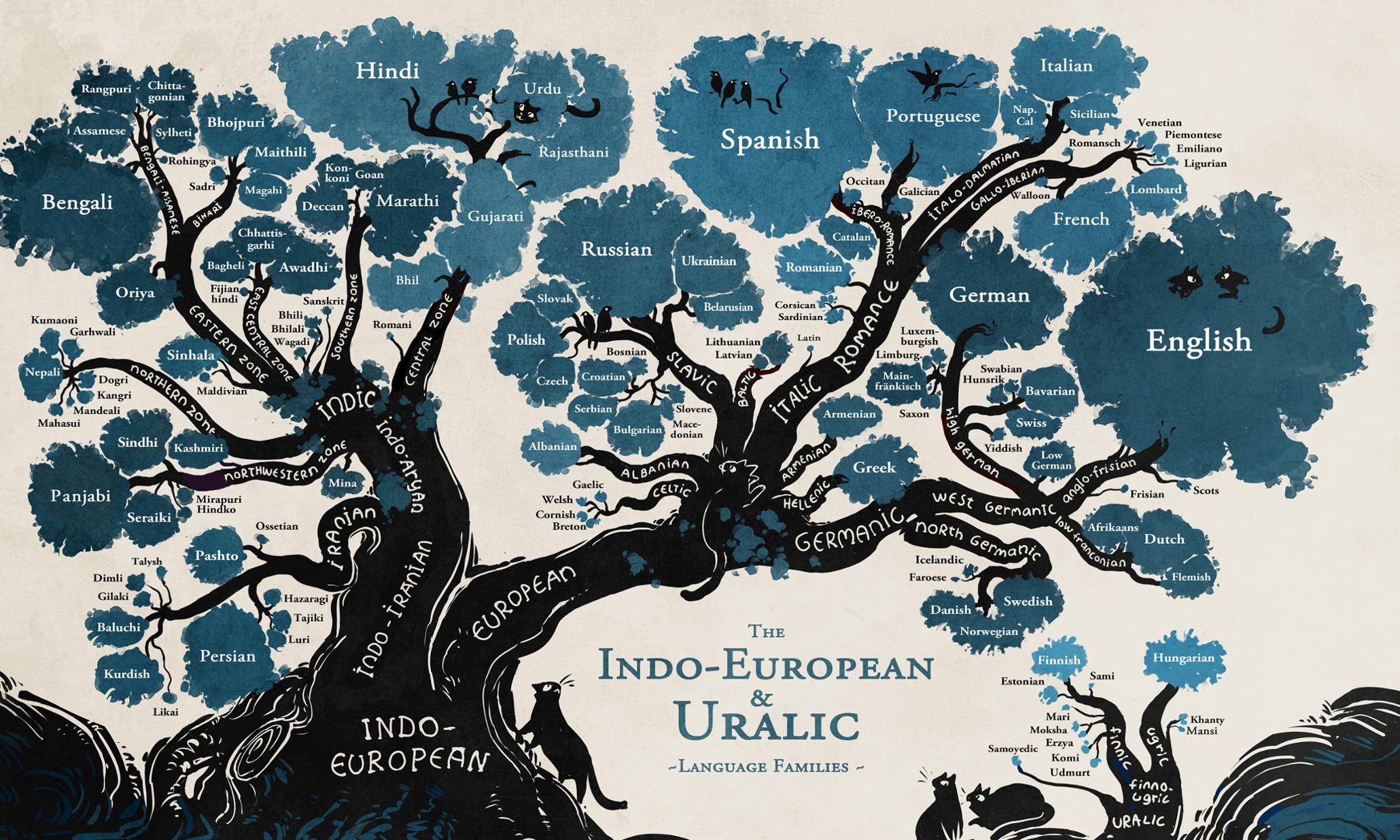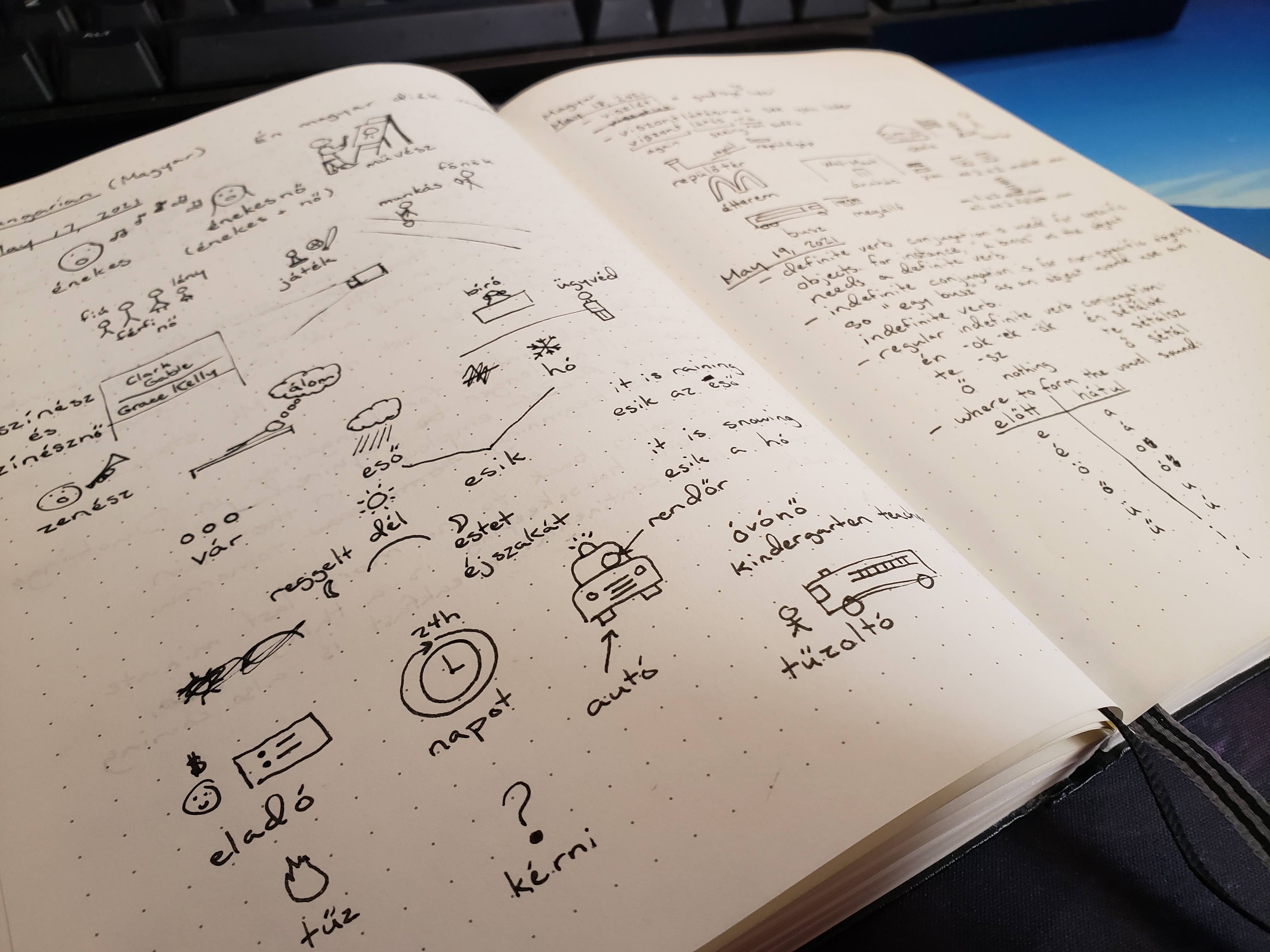Posted: May 21, 2021
Categories: magyar
One week of Hungarian
Today marks my first ever 7 day streak in DuoLingo. I have attempted to learn Hungarian before, but apparently not for 7 days in a row. During the past week I’ve learned some basic phrases and greetings, some of the basic grammar for the present tense singular, and I have a general sense of the word order rules. I can now confidently say én magyar diák vagyok (I am a hungarian student). Well, somewhat confidently… magyar is an adjective there and I’m not sure if it works the same as English where it can either mean “I am a student of Hungarian descent” or “I am a student of Hungarian”. Perhaps there is more I need to learn in order to say it correctly.
UPDATE: Magyarul tanulok is a better way to say this.

Things I learned this week about Hungarian
Here are some interesting things I learned this week about Hungarian.
Word order nuance
Hungarian word order is more flexible than English. However, it’s important to realize that this does not mean Hungarian word order doesn’t matter. Certain phrases cannot be jumbled. For instance, articles and adjectives seem to always come before the noun they modify, so te a fiatal fiú látsz (you see the young boy) cannot be rephrased as te fiú a látsz fiatal. However, the I believe the sentence can be rephrased as te látsz a fiatal fiú to place more emphasis on látz (see).
Which segues into what happens when you use different word ordering in Hungarian. The two places where the main emphasis is placed in a Hungarian sentence are the beginning of the sentence, and directly before the verb. In fact, the focus of words directly before the verb is so strong that it’s required for question words like mi (what) to be there. For instance, mi látsz? (what do you see?) can’t be rephrased as látsz mi?. So when you place a word in a different place in the sentence, you are usually not changing the literal meaning of the sentence, but you are changing the emphasis.
UPDATE: My understanding of this is incorrect Judit294350 (and jzsuzsi) kindly pointed out on the DuoLingo discussion boards:
“te a fiatal fiú látsz?” - Sorry several mistakes here.1: You do not normally use the pronoun. If you do it is for emphasis and this sentence’s emphasis is “a fiatal fiú”2: The direct object has t be put in the accusative “a fiatal fiút”3: A definite diret object uses a different conjugation - the definite conjugation - which you would not have learnt yet - so látod not látsz.4: I also have a sneaky suspicion it would be meglátod.
Optional pronouns (and sometimes verbs)
Hungarian doesn’t always require a pronoun when the verb already conveys that information. For instance, én látok egy almát and látok egy almát both mean “I see an apple”. The -ok suffix on lát tells us that the verb is in the first person, so adding én is optional.
~~In a very special case verbs can also be optional. This is the case for the verb van (he/she/it is) and only in the third person. So instead of saying piros autó van we can say piros autó, and both mean “the car is red”. We can’t do this for other conjugations of van, however, so jól vagyok (I am well) has to include vagyok.~~ See update below.
UPDATE: jzuzsi pointed out that the second paragraph here is incorrect.
“In a very special case verbs can also be optional. This is the case for the verb van (he/she/it is) and only in the third person. So instead of saying piros autó van we can say piros autó, and both mean “the car is red”. We can’t do this for other conjugations of van, however, so jól vagyok (I am well) has to include vagyok.”In this case it is not optional. You have to omit van. The car is red. Az autó piros.You said “and both mean the car is red”…. actually none of them means that. “piros autó van” can mean “There is a red car” and “piros autó” = “red car”.
Genderless grammar
Hungarian does not have grammatical gender, so there aren’t different versions of verbs, nouns, pronouns, etc. for different genders. This also means that unlike many other languages (looking at you, Latin) random objects don’t have a gender. Hungarian specifies no gender by default, although you can specify that a noun is female by tacking on nő (woman) to the end. For instance, színész is actor, and színésznő is actress (literally “actor woman”).
Unexpected similarities to English
The Hungarian people (Magyars) descended from the Ugrians Ugrics (thank you csepcsenyi!), a people that lived near the Ural mountains. Some of these people moved west at some point. These people later split again, with one group, the Finns, going north, and the other group, the Magyars, settling in the Carpathian basin. As a result, the Hungarian language has very little in common with other European languages, it’s closest relatives being Khanty and Mansi which are spoken by remaining Uralic tribes to this day. Its closest relatives in Europe are Estonian and Finnish.

The reason I’m leading with that is to demonstrate why I’m surprised when Hungarian has similarities to English, since they are nowhere near each other in the family tree of languages.

One similarity I found interesting is that just as in English, székeket festek (I paint chairs) can either mean “I paint pictures of chairs” or “I paint actual chairs”.
Another interesting similarity is that just as in English we don’t put “a” before a word starting with a vowel, instead adding a consonant to make it “an”, in Hungarian the definite article a gets changed to az when it comes before a word starting with a vowel.
I’m not 100% sure on this, but from what I can tell “objects” predicates of van are not in the accusative case in Hungarian, just as “objects” predicates of “is” are not in the objective case in English. Whether Hungarian has predicate nominatives or if this is for some other grammatical reason is a point of future research for me.
UPDATE: jzuzsi confirmed that these are predicates and not objects in both English and Hungarian, and are in the nominative case.
There are also certain vocabulary similarities especially with modern words, like telefon meaning “telephone”, but these are less interesting to me since I’m pretty sure they’re loan words from the rest of Europe and really just show the influence English has on the world’s languages.
Pronunciation issues
I’m sure I’m mispronouncing many things and have a heavy American accent, but the most glaring things I notice about my pronunciation at the moment are the following:
- Te. This is pronounced “teh”, not “tay”. Years of pronouncing the Latin word “te” as “tay” are coming to haunt me.
- Rolled R’s. I can’t roll my r’s yet. I can do a voiced dental tap, but not a trill. I also struggle with r’s before some consonants, like vársz.
- Nyt. I’m not sure if I’m trying too hard or what, but I have a really hard time doing this sound. The Hungarian consonant ny is pronounced like the ny in Kenya without including the “a” (so not nyuh). I can pronounce it before vowels easily, and before some consonants, but for some reason when it comes before “t” I have a lot of trouble, so words like lányt become difficult for me.
- Az. This is pronounced similar to “ahz”, not like the English word “as”. For some reason I am occasionally mixing up these vowels, usually in az but sometimes in other words like tanár (teacher).
Studying techniques
There are a few studying techniques I am trying to employ to help with my understanding of Hungarian.
One technique is to try to visualize the concept of a word instead of tagging it with the English equivalent in my head. For instance, instead of thinking “tűz means fire” I say tűz while visualizing a campfire. I think to some extent, at least at first, some tagging does happen regardless, because I’m finding that with many words I still think the English word instead of simply understanding the Hungarian word. I hope that as I study, speak, and listen to Hungarian more that will gradually become less and less of an issue.
To help with memorizing words I’ve been doodling their meanings and then writing the word below. I keep a bullet journal, so in addition to these doodles I also keep notes of things I have trouble remembering.

I really want to start speaking Hungarian to a native speaker. There is a virtual group lesson series available that I plan to attend soon. I’d love to find a Discord server for Hungarian language learning, but I haven’t been able to find one. I may also try language exchange at some point, but my Hungarian skills aren’t good enough for that yet.
Things I wish I knew earlier
One thing I learned a couple days ago that I wish I knew way earlier is that the DuoLingo website has Hungarian tips which include grammar explanations, etc., but the DuoLingo mobile app only has tips for Spanish, French, and Chinese at the moment. So do yourself a favor and open the website and read the tips before you start a new bubble. It will save you a ton of trial and error.
Come on DuoLingo devs, you can do better than that.
Also, each DuoLingo exercise has a discussion thread which you can access after you complete the exercise. Be sure to check it out when you have questions about why an answer is right or wrong, or whether you can phrase a word a different way, or what a word actually means, or whatever. There are a few native speakers that seem to be pretty active, and I’ve usually gotten responses to my questions within hours. I’ve also found that many times my question has already been asked and answered very thoroughly.
Additional Language Learning Resources
I’ve been using the following resources in addition to DuoLingo:
HungarianReference.com- though this website looks like it was made in 1999 and has an occasional English typo, it’s actually a very good resource, especially for grammar.Be aware that this website has Hungarian typos and inaccuracies as well and was not written by a native Hungarian speaker.- Glosbe - a useful dual-language dictionary
- Wiktionary - good for looking up definitions for Hungarian words and also their conjugations and suffixes
- Drops - this seems to be a good vocabulary trainer. I like that it uses pictures to represent the Hungarian words instead of English words. I do about five minutes of these exercises a day.
- /r/hungarian - this is a great community of Hungarian learners and teachers/speakers. I’ve had a few positive experiences with various questions over the past week, as well as searching for answers to questions I had.
Credits for corrections
If I missed anyone else who critiqued this post, I apologize. Please see both the DuoLingo thread and the Reddit thread to see the kind help people put into correcting statements in this post. :)
Further reading
A non-exhaustive list of resources and articles that were referenced by people critiquing this post:
Comments